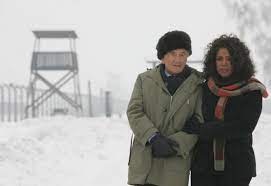Opinions Based On Opinions

October 20, 2021
Hi my name is Jamai Weaver. I am in 9th grade and I thought I should share this essay I wrote with you. In my Pre-College English class, we were told as an assignment to write our opinions/thoughts on Oprah Winfrey’s interview with Holocaust survivor Elie Wiesel. When I finished writing I realized that my piece included a lot of personal connections, so I thought to suggest it as an article idea, and with that being said, here is my article ,“Opinions Based On Opinions.”
Oprah and Elie Wiesel Interview Reflection
After reading, and then watching the footage taken of Oprah interviewing Elie Wiesel, I have no words. After hearing all that Wiesel had to say, and seeing a part of what he has been through, I don’t know how he can fathom the courage to go back to Auschwitz or to even live. People like Elie Wiesel have a good heart because even after all they’ve gone through, they still believe people and humanity can change.
While reading the interview there were two quotes that stood out to me. I grabbed my Post-it’s and wrote on the top “Great Quotes.” In the first quote, Wiesel says, “It’s an insult. Every tragedy is unique, just as every human is unique. When a person loses someone dear to her, who am I to say that my tragedy was greater? I have no right. For that person, her tragedy is the greatest in the world- and she is right in thinking so.” In reading this quote I thought of all the times a person has told me to calm down, and that what I thought was serious; wasn’t really serious, but how can somebody who’s been through hell and back say such a thing? Is it because he wasn’t the only one? Was it because there were other forms of monstrosities, that although were incomparable to this one, were still horrific? How can Elie Wiesel not be selfish, and to think, he thought there were others worthier than him to live. The irony is we will never know if there was.
The second quote isn’t as powerful, but it spoke to me on a personal level. Wiesel says, “The essential questions have no answers. You are my question, and I am yours- and then there is dialogue. The moment we have answers, there is no dialogue. Questions unite people, answers divide them. So why have answers when you can live without them.” I can relate to this quote. I can relate to this quote because it’s like seeing the downfall to honesty, to bluntness, and to opinion. People gather to hear what one has to say, people become curious and ask questions, but if they don’t get the answer they want, they get mad. Wiesel’s words speak to that. Why have answers if you can live without them? If a person doesn’t love you but chooses not to tell you, what you don’t know can’t hurt you because, in the end, you still have that person. If you are a baby and somebody dies, then later in life you see this unrecognizable person in a picture, so you ask “who is this?” You will be less hurt if the person you asked responded by saying “nobody,” rather than them telling you the person is dead. That is the irony that shines through all the words spoken by Elie Wiesel. He himself is ironic because he shows that if he can have love and no hate when treated so horribly, how can somebody who hasn’t even been through a fraction of that pain, feel so much hatred?
The funny thing is he answers that question in the first quote. Why give answers if not everybody wants to hear or believe the truth? Because if nobody responds there is no dialogue. That is the irony! In everything said and done by mankind. Everybody has an opinion. Everybody has their own reaction to a situation. Every situation has a different start. Yet in the end, everybody wants to know what happened. Everybody wants to ask questions, and each person is going to give them a different truth. After reading this interview, I realized that Elie Wiesle is something one might call a miracle, because not everybody can be that strong and weak, at the same time. Not everybody is built to love. That’s why, when asked why did the Germans do what they did? How and why did the Holocaust start? Nobody can give a straightforward answer, because, in the end, everybody does something for a reason, whether that reason is right, wrong, or justifiable. Nobody can answer, because the same way people tell the truth, the same way people lie, the same way people like, dislike, love, hate. People breathe. Nobody can really answer a question. In the same way, nobody really knows why people live. Why they breathe. Here are my thoughts, take them as you will, for I am alive, and I have an opinion.
